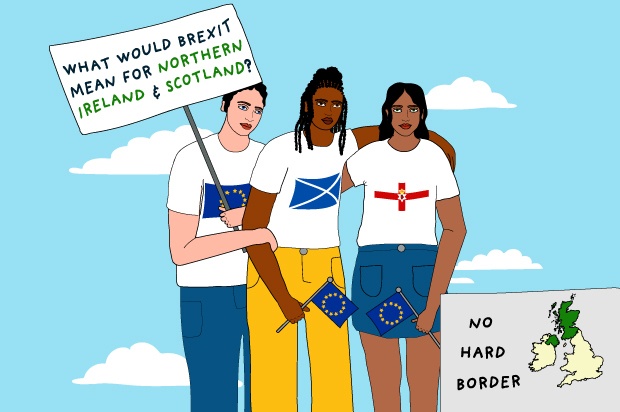How will Brexit affect Northern Ireland and Scotland?
Each country that makes up the United Kingdom will be affected differently by Brexit, but Northern Ireland and Scotland face more complications than England and Wales.

Backstop. Hard border. Indyref2. These are all new terms that have become part of the Brexit debate since the referendum in 2016. But what do they mean? Here’s our guide.
Northern Ireland
The remain vote won in Northern Ireland, with 55.8% of the voting public choosing for the UK to stay within the EU.
But tensions in Northern Ireland go back further than Brexit. The Troubles, as they were called, were a 30-year period of violence between paramilitary groups who were either unionists, who were Protestant and looked towards the United Kingdom or loyalists who were Catholic and wanted a united Ireland.
Thousands of people were victims of bombings and other violent incidents. But a peace deal was brokered in April 1998, known as The Belfast Agreement or The Good Friday Agreement because of the day on which it was signed.
Why does the border matter?
During the Troubles, the 310-mile border between Northern Ireland, which is part of the United Kingdom, and The Republic of Ireland, which is an independent country, was heavily patrolled by both police and soldiers.
Part of the peace agreement was to soften the border allowing for greater co-operation between the two countries. Now, some people commute across the border daily, to go to work or pick up shopping. Some houses and gardens straddle the border.
A no deal Brexit, or a Brexit deal where we leave the EU Customs Union (see our Jargon Buster at the bottom the page for more on this) would leave the Republic of Ireland within the EU and Northern Ireland outside it.
This would mean a return to border controls and checkpoints. This would be inconvenient at least and some people fear that enforcing a split between the two countries could reignite the violence that mostly calmed down 20 years ago.
At the moment, as both the UK and the Republic of Ireland are part of the EU there is no need to check up on people, goods and money moving between the two countries (and between any of the other countries in the European single market).
Brexit and a hard border would change that.
What is the Irish Backstop?
The Irish Backstop is the common name given a deal that Theresa May’s government agreed with the European Council. This deal aimed to prevent a border with customs controls. This agreement wasn’t made official and it was replaced in 2019 by Boris Johnson, who wished to renegotiate.
Johnson wants Northern Ireland to be legally part of the UK’s customs laws, but operate as though it is a part of the EU Customs Union.
The Republic of Ireland, still part of the EU, are insistent that an Irish backstop must be in place. In Northern Ireland, the Democratic Unionist Party want to make sure there is no hard border between Northern Ireland and the rest of the UK. At the time of writing, the Conservative party are reliant on the votes of MPs from the DUP to form a parliamentary majority.
The DUP’s objections are thought to be one of the main reasons the bill keeps getting stuck in parliament and not agreed to anyone’s satisfaction. It is such a difficult situation that recently leaked documents from the civil service state that the Northern Irish border may scupper Brexit altogether.
Scotland
In 2016, 62% of Scottish voters elected to remain in the EU, the highest proportion of any of the countries in the United Kingdom. Not one Scottish constituency had a majority leave vote, whereas in England, Wales and Northern Ireland, areas were mixed in their voting patterns.
Two years before, in September 18 2014, Scotland held another referendum, deciding whether to stay as part of the United Kingdom, or to become an independent country. At that point, voters decided they wanted to stay within the UK, with 55.3% voting against independence.
But polls suggest that Brexit may have changed the minds of Scottish voters, and that remaining in the EU may be more important to them than remaining within the United Kingdom. The Scottish National Party, led by Nicola Sturgeon, have promised a new referendum on Scottish independence, known as indyref2, which will take place in 2020 if their party receives enough votes in the coming general election.
Brexit Jargon
The Customs Union: An agreement between EU countries not to charge taxes on things passing between EU member states, and to charge the same taxes on goods coming in from other countries.
Hard border: A border with passport checks for people and customs checks on good, usually used in the context of talking about Northern Ireland.
Soft border: Also known as a frictionless border. A crossing between two countries with no checks and often no visible sign that you have passed from one country to another.
You can keep yourself up-to-date on events, by reading a variety of newspapers and websites to get a balanced view. You can also visit The Mix for factual breakdowns. If you’re worried about Brexit or find it is making you anxious, read our advice here.
Think we could improve our Brexit content? Take part in our Brexit survey here and tell us how!
Next Steps
- Here for Good offer free immigration advice to EEA citizens and their non-EEA family
- Coram's Children's Legal Centre offer legal advice about applying for settled status
- The EU Londoners Hub is a brilliant resource (not just for people from London!) If you or your family are from the EU you'll find lots of detailed information on their website
- Find your local Citizens Advice here, for free and independent legal advice. Or call their helpline. 03454 04 05 06
- Chat about this subject on our Discussion Boards.
By Holly Turner
Updated on 12-Dec-2019
No featured article














